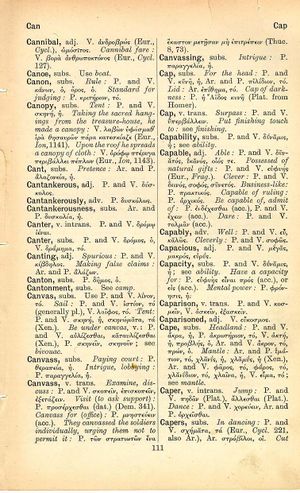canon
ὁ δὲ πείσεται εἰς ἀγαθόν περ → he will obey you to his profit, he will obey you for his own good end
English > Greek (Woodhouse)
subs.
Rule: P. and V. κάνων, ὁ, ὅρος, ὁ.
Standard for judging: P. κριτήριον, τό.
Latin > English (Lewis & Short)
cănon: ŏnis, m. (acc. canona, Plin. 34, 8, 19, § 55;
I acc. plur. canonas, Aus. Ep. 136; in Cic. Fam. 16, 17, 1, used as a Greek word), = κανών κάννα, κάνη, a reed, cane.
I A marking or measuring line; hence, a rule, canon, model (cf. Lidd. and Scott, under κανών).—
II Esp.
A A wooden channel in hydraulic instruments, Vitr. 10, 13 Rod.—
B Under the emperors, an annual tribute, established by law, in grain, gold, silver, clothing, etc., Spart. Sev. 8; Lampr. Elag. 27.—
C In eccl. Lat., a catalogue of sacred writings, as admitted by the rule, the Canon, Aug. Doctr. Christ. 2, 8; Hier. Prol. Gal. Aug. Civ. 17, 24; 18, 38; cf. Isid. Orig. 6, 15 and 16.—
D Also in late Lat., from their shape, in plur.: cănŏnes, um, cannon: et illic figere gunnas suas, quas Galli canones vocant, quibus validius villam infestare posset, Thom. Walsingham in Henry V. p. 398.
Latin > French (Gaffiot 2016)
cănōn, ŏnis, m. (κανών), loi, règle, mesure : Plin. 34, 55 || tuyau de bois dans une machine hydraulique : Vitr. Arch. 10, 13 || contribution, redevance annuelle sur l’or, l’argent, le grain : Spart. Sev. 8 || ensemble des livres sacrés reconnus par l’Église comme d’inspiration divine : Eccl.

